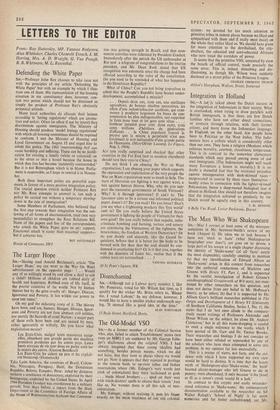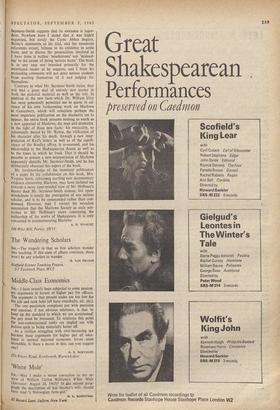The Man Who Was Shakespeare SIR,—May I correct at least
some of the misrepre- sentations in Mr. Seymour-Smith's review of my book (August 6). He takes me to task because I have not 'stuck to facts' (what Shakespearian biographer ever does?), yet goes on to devote a large part of his review to a single chapter discussing the identity of 'Shake-scene' (of all 'facts' surely the most disputable), carefully omitting to mention (a) that my identification of Edward Alleyn as 'Shake-scene' arises in this context from researches into the authorial connections of Marlowe and Greene with Henry VI, Part I, and is supported by the careful investigation of Robert Greene's autobiographical Groatsworth of Wit story, not men- tioned by other researchers on this question, and does not derive from any belief in Mr. Hoffman's theory, as he infers; (b) that it is supported by Dr. Allison Gaw's brilliant researches published in The Origin and Development of 1 Henry VI (University of Southern California Studies, Series 1, No. 1). He states that I do 'not once allude to the compara- tively recent writings of Professors Alexander and Dover Wilson on the subject, let alone Dr. Andrew Cairncross,' but in all this name-dropping is careful to omit a single reference to the works which I have quoted of Dr. Gaw and Dr. Tucker Brooke. Their researches and findings I do not consider to have been either refuted or superseded by any of the scholars who have since attempted to solve this problem, in my opinion far. less successfully.
This is a matter of views, not facts, and the evi- dence with which I have supported my own view would be hard to dismiss. It is time that the hoary myth of Shakespeare-alias-'Shake-scene,' the hard- hearted player-manager who left Greene to die in penury, were abandoned, if only because 'it fits [him] as ill as a raven's croak would fit a lark.'
In contrast to this cryptic and easily misunder-
stood reference to 'Shake-scene,' the contemporary documentation available to the researcher on Sir Walter Ralegh's 'School of Night' is far more numerous and far better authenticated, yet Mr.
Seymour-Smith suggests that its existence is legen- dary. Nowhere have I stated that it was highly organised, but surely the Cerne Abbas inquiry, Bruno's statements, at his trial, and the numerous references extant, witness to its existence in some form, and to discuss the personalities involved as I have done is neither 'mischievous' nor 'mislead- ing' to the extent of doing 'serious harm.' The book is in any case not intended primarily for the uninitiated reader as he suggests, and I hope his misleading comments will not deter serious students from availing themselves of it and judging for themselves.
Contrary to what Mr. Seymour-Smith states, they will find a great deal of entirely new matter in both the pictorial material as well as the text. In addition to the new facts which Dr. William Urry has most generously permitted me to quote in ad- vance of his own forthcoming work on Marlowe at Canterbury, which will constitute perhaps the most important publication on the dramatist yet to appear, the entire book presents nothing so much as a new appraisal of Marlowe, the man and dramatist. in the light of these new facts: his musicality, so vehemently denied by Dr. Rowse, the vilification of his character after his death, through a new inter- pretation of Kyd's letters as well as of the signifi- cance of the Bradley affray, is re-assessed, and his relationship to the Shakespearian drama as well as to the times in which he lived. That it should be Possible to present a new interpretation of Marlowe apparently disturbs Mr. Seymour-Smith, and he has deliberately obscured this aspect of the book.
My foreknowledge of the imminent publication of a paper by my collaborator on this book, Mrs. Virginia Stern, containing startling new documentary evidence concerning Marlowe, may have inclined me towards a more open-minded view of Mr. Hoffman's theory than Mr. Seymour-Smith evinces, but open- mindedness is surely the prerogative of any serious scholar, and is to be commended rather than con- demned. However, may I correct his mistaken assumption that the Marlowe Society as such sub- scribes to Mr. Hoffman's views concerning the authorship of the works of Shakespeare. It is only concerned in commemorating MarlOwe.
196 West Hill, Putney, SWIS
A. D. WRAIGHT































 Previous page
Previous page